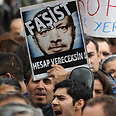
'Erdogan's clear pursuit of autocracyled to growing anger among Turkish public.' Istanbul protest
צילום: EPA
Governing without criticism
Op-ed: Calm may be restored in Istanbul, but blow suffered by Erdogan marks end of his honeymoon with voters
It seems the Turks have no reason to complain. Their ruling party, AKP, was elected in completely legal elections and has maintained a stable majority in the parliament for about a decade now. Turkey's economy is still thriving, even in light of the global crisis. The quality of life measures are on the rise, and unemployment is being reduced. Even the Kurdish terror, which bothered the Turks for many decades, is decreasing.
But below the surface, several processes taking place in recent years have led to growing anger among many parts of the public. The most notable process is Erdogan's clear pursuit of autocracy. Turkey has always been an authoritarian country, but in the 1990s and in the beginning of the current decade it developed a democratic tradition. The army lost its power of influence in politics, the elections became more democratic, and freedom of speech increased.
But over the years, the prime minister began seeing himself as a ruler graced by God – one who knows better than anyone else what to do and how. Turkey's policy was run according to his dictations. From removing a statue he thought marred the view through setting curriculums to construction plans in the central square – everything was set and decided by him. The decisions were arbitrary, and could not be appealed.
In recent years, Erdogan has refused to accept any criticism against his government and his conduct in the media. Journalists who criticized the government found themselves jobless at best, and sometimes even in jail. Newspaper editors who disobeyed him were visited by income tax assessors, who suddenly discovered gaps in tax payments worth millions. Public figures, academics, lawyers and military officials who voiced public criticism were arrested and jailed for conspiring against the government.
Speeding up Islamization
Following his victory in the 2011 elections, Erdogan decided to speed up the public sphere's Islamization rate – alcohol sales were reduced to a minimum, excluding Istanbul's main tourist areas, mosques were set up on every corner, the curriculums were changed and religious studies were boosted, censorship was imposed on television programs whose content the government did not approve of, and people like famous pianist Fazil Say were prosecuted following anti-religious tweets on their Twitter accounts.Alongside all this, and perhaps even worse, is the fact that the current government will not tolerate any protests against its policy. In the past year, the government has strongly cracked down on several such demonstrations: Students at a university in Ankara who dared protest against the government were beaten up and injured, peaceful civilian processions in honor of the republican holidays (marking the Republic of Atatürk) were curbed at their very beginning, and workers who gathered for the traditional May Day procession were dispersed violently with huge amounts of tear gas.
All this did not lead to civil disobedience, but it did unite camps which allegedly had nothing to do with each other before – seculars and religious opposing the silencing, socialists and environmentalists, Turks and members of minority groups.
The protests of the past few days will be suppressed, and calm may be restored in Istanbul, but the prime minister and his party suffered a blow this week which marks the end of their honeymoon with their voters.
Professor Dror Ze’evi is an expert on Turkey at Ben-Gurion University










